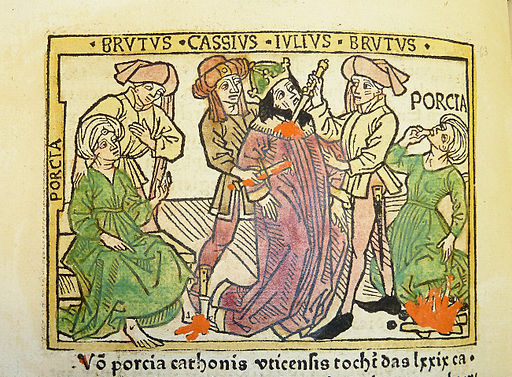
September 21, 2014, by Esther Eidinow
Greek for the Globe
Requests for translation into ancient Greek are understandably rare. But one was passed on to Oliver Thomas recently from a friend-of-a-friend at the Globe Theatre.
For their production of Julius Caesar the Globe’s creative team wanted to mark the three main deaths (those of Caesar, Brutus and Cassius) by adding a small female chorus of Greek-speaking slave-women singing a brief lament. I imagine this was a nod to the importance of Greek tragic choruses in the history of Western drama, and also, historically, to the number of Greek-speaking slaves in Rome at the end of the Republic, and to the role of women in singing funeral laments (neniae) at Rome and elsewhere.
But what words were these slave-women to sing? The team had selected two verses of an American slave-spiritual:
I know moonrise, / I know star-rise. / Lay this body down.
I walk in the moonlight, / I walk in the starlight, / To lay this body down.
The same verses also featured, in English and ungrammatical Latin, as Lucius’ unscripted song at the end of Act IV. As well as having the appropriate elegiac tone, and origins in a slave-society, the spiritual fits one of the play’s key threads of imagery – the motions of celestial bodies, implicitly or explicitly compared to the rise and fall of politicians. I was particularly pleased by this connection, since my favourite Greek tragedy – Aeschylus’ Agamemnon – has exactly that metaphor in its opening speech.
As usual, the translation involved setting priorities. Besides the rather serious constraint that the composer needed the words that day and I only had twenty minutes free, I decided that my main priority was to capture the original’s spare and repetitive style. In particular – since Greek laments were full of repetitions too – I wanted to preserve a refrain (‘Lay this body down’) which is more grammatically integrated the second time round. I was also under the impression (which turned out false) that the composer might want to fit the words around the traditional tune, so I tried to be as thrifty with syllables as I could. By contrast, I figured that the Globe’s audience wouldn’t be offended if I took a few liberties with producing metrically and linguistically polished Greek. So, for example, I decided not to translate ‘lay… down’ in the refrain with the correct compound verb (κατατίθημι), but instead to produce a line with the syllabic shape long-long-short-short-long, roughly like the original. After a bit of toying I came up with the following, recorded a pronunciation guide, and sent it off:
ἀντολὰς σελάνας / ἀστέρων τε οἶδα, / θήσων τὸ δέμας.
ὑπ’ αὐγαῖς σελάνας / ἀστέρων τε βαίνω, / θήσων τὸ δέμας.
For my efforts I got two complimentary tickets, and enjoyed the show very much. I was delighted to be able to use my knowledge of Greek to contribute to a non-classical production – even if Julius Caesar is the origin of the dismissive phrase ‘It’s all Greek to me’.
Image: Woodcut illustration (leaf [m]8v, f. cviij) of Porcia Catonis counseling Marcus Junius Brutus, Julius Caesar’s death at the hands of Brutus and Gaius Cassius Longinus, and Porcia’s suicide, hand-colored in red, green, yellow and black, from an incunable German translation by Heinrich Steinhöwel of Giovanni Boccaccio’s De mulieribus claris, printed by Johannes Zainer at Ulm ca. 1474 (cf. ISTC ib00720000). Image created by the Provenance Online Project from Penn Libraries call number: Inc B-720. See https://www.flickr.com/photos/58558794@N07/6693294857.
No comments yet, fill out a comment to be the first

Leave a Reply